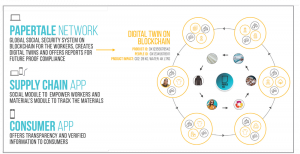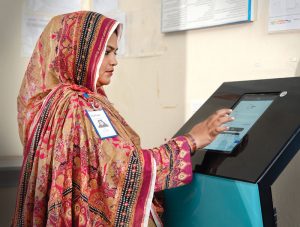Blockchain technologies can be used to empower suppliers and workers.
TW Special Report
Gone are the days when compliance meant checking off boxes on a form. A myriad of new due diligence legislation is in the pipeline, and legislation already in effect is revealing heavy consequences.
One noteworthy example is a case against IKEA regarding the labor conditions for IKEA suppliers in Bangladesh and Pakistan. This case was brought about because of the Norwegian Transparency Act implemented in 20221. The act requires companies to carry out due diligence activities to ensure they operate responsibly, respecting human rights and decent working conditions. The Norwegian Consumer Protection Authority (NCPA) investigating the case ruled that IKEA did not breach the law, but this verdict was based on time constraints: the complaint was issued on the day the law came into force. Notably, the NCPA warned that companies are expected to deliver a higher level of due diligence from now on, with little room for exemption based on contractual confidentiality.

Stricter legislation also extends beyond European borders. This is demonstrated by legislative developments in the United States. The Corporate Governance Improvement and Investor Protection Act was passed by the house in June 2021 and is currently before the senate. This act would require companies to periodically disclose information, including metrics, related to social and governance performance2.
It can thus be concluded that the conventional approach of relying solely on audits is becoming obsolete from a regulatory standpoint. But pressure regarding due diligence is also increasing from non-legislative parties. According to a survey conducted in 2020 by Fashion For Good, 69 percent of consumers want to know how their clothes were made, as opposed to 59 percent in 20183.
Furthermore, in a 2020 survey conducted by Eurobarometer, nearly half of Europeans “totally agreed that clothes labeling should contain information on both environmental impact and working conditions of the workers4.” Additionally, in September, Nike’s shareholders issued a letter, pressing the company to pay $2.2 million to compensate garment workers who had claimed wage theft at supplier factories.
These pressures raise the question of how companies can stand strong in the face of this rapidly evolving compliance landscape. Companies need to put themselves in a future-proof position, to withstand legislation that becomes increasingly stringent and maintain a relationship of trust with consumers and shareholders.
Here, PaperTale, a Sweden-based technology company steps in as a transformative enabler, using block-chain technology as a unique tool.

Common Application Of Blockchain Technology
Blockchain technology already is in use as a tool for tracing materials. This is one way in which PaperTale uses the technology — its system creates a digital duplicate, also known as a “digital twin,” for each material. When the physical material moves to the next party in the supply chain, the same action is mirrored in the digital realm. This transaction is recorded on the blockchain, along with confirmation from the receiving party that the physical material matches its digital twin. For an extra layer of validation, evidence of material purchase can also be included. Through this process, materials can be tracked throughout the entire supply chain.
With blockchain, transactions are validated and stored by a community as opposed to conventional systems where data is stored by one party, in which case the data can easily be manipulated by that party. The benefit of involving multiple parties is that it becomes nearly impossible to change the data: before recording the data, all parties have to validate it together. Once data is recorded, every party maintains the data history in chronological order, so that changes cannot be made without notifying the entire community.
PaperTale’s use of blockchain technology is unique because it employs a public blockchain rather than a private one. Because the community recording and validating data is open to everyone in a public blockchain, PaperTale argues that it results in a more inclusive type of transparency. However, the degree of transparency is still customizable: every party using the solution can choose to put some data on the Blockchain, while restricting access to other — more sensitive — data.
The type of data that the blockchain is applied to is another way that distinguishes PaperTale’s use of the technology. PaperTale uses blockchain for data related to environmental impact and material tracking, which is fairly common. The innovative aspect of PaperTale’s technology lies especially in applying the technology to the social impact of production, as this is still largely unexplored.
Using Blockchain For Social Governance
First, it is possible to map out the workforce in a factory by registering workers’ IDs. This is done by simply integrating PaperTale’s system with enterprise resource planning (ERP) and product lifecycle management (PLM) systems, which are already in place in a large part of the industry. PaperTale tested multiple methods for the verification of IDs and landed on banks as a suitable third party. ID registration opens the door for the main asset of using blockchain in social governance — wage verification of workers along the supply chain. Wage transactions can then directly be connected to the blockchain. As a result, other parties like brands, consumers, and legislators have direct insight into verified wage payments, with high confidence that this data is authentic and has not been manipulated. It is worth noting that displaying the exact wage is optional with blockchain. Currently, the PaperTale system checks whether the wages are above the threshold defined by the local law of the area where a facility is located.
It could be argued that payment according to law is not high enough as a standard, but PaperTale’s solution is being developed with a focus on the supplier’s perspective. As sup-pliers can face financial pressures, increasing wages by a fixed amount can be difficult in the short term. Instead of raising the wage threshold in the system, PaperTale therefore came up with a different approach —the profit-sharing system. Here, a percentage of the net profits are shared amongst all employees of the factory. This percentage is distributed in a way that promotes equal opportunity and reflects the collective effort and dedication of the entire workforce. The mechanism of distribution is still being fine-tuned, as well as educating workers about how the calculation takes place.
Whereas capturing the financial reality of workers is quite black and white, other factors of social governance, such as workplace safety, are more of a gray zone. However, having ventured into this uncharted territory, PaperTale reports that it is possible to connect social governance-related data with a fairly high confidence level to the blockchain.

A Supplier’s Perspective
Building on the ID registration of the workers, PaperTale built an app for the workers to use. This app opened up further possibilities to gather on-site data, and for connecting workers directly to the system. The app gives workers the ability to view their contracts and salaries. In turn, they can check whether the two correspond, and press “verify” if this is the case. The percentage of workers that have verified their wages then turns into data about the facility. For example, facilities where more than 80 percent of workers have confirmed their wages can be rewarded. Likewise, workplace safety can be measured by sending forms to workers that allow them to answer questions about their working environment. Worker attendance can be tracked through devices that allow workers to record the clock-in and clock-out times for their shifts, using fingerprint scanning and facial recognition technology. After implementing this, PaperTale found that attendance data can be combined with the contractual functionality of the workers’ app and functionality was added that requires employers to request overtime from the workers through the app. In this way, over-time hours are added automatically to the wage calculation, which workers can then monitor for themselves and verify through the app.
With this method, PaperTale’s system is a tool for worker empowerment in parallel with supplier empowerment, breaking the cycle of imposing demands on suppliers that they are unable to meet due to resource constraints. The system allows suppliers to showcase their efforts, and use this as an enabler to build trust for compliance. Brands can then extend this trust to their consumers and shareholders.
Although PaperTale’s system has not reached a 100-percent confidence level for data related to working conditions, manipulating this system would take significantly more effort than manipulating audits. But while audits are not the main focus of PaperTale’s new method, they still play a role. Rather than being the centerpiece, they are a component of PaperTale’s solution. For example, periodical audits are used to measure building safety. These audits are performed by auditing bodies that can verify the results in PaperTale’s system, after which the results are published onto the blockchain. In this way, conventional methods like audits are combined with innovation to form building blocks of a more solid system.
To optimize results, innovation should continuously take place with ongoing reflection on outcomes. PaperTale’s technology is being implemented and tested on the ground in the Outso Wearables factory, in Lahore, Pakistan. Outso has successfully implemented worker ID and wage registration, verification of wages by workers through the app, recording attendance, and even the profit-sharing mechanism. One gap PaperTale identified is training workers to educate them about their rights and thereby maximize their ability to benefit from the technology. Outso’s workers are closely involved in PaperTale’s solution development. To measure worker satisfaction, the Outso factory carried out an anonymous survey that measured the satisfaction level of workers as compared to their previous workplace. After implementing the measures mentioned above, worker satisfaction had improved from 71 to 93 percent. The factory also experienced fewer delays and improved quality of work.
Moving Beyond Blockchain’s Hype
PaperTale is eager to demonstrate that recording certification on blockchain technology is only the start of what the technology can do. By supplementing certification with real-time environmental and social data, the full potential of blockchain technology can be unlocked.
The aforementioned usage of a public blockchain is another way of going beyond blockchain’s hype, and to tackle the issue of techwashing. The company noticed that the phrase “Blockchain Technology” is frequently used for public relations-related reasons rather than practical, on-the-ground innovation. Such blockchain-related techwashing came as no surprise to PaperTale, given the share of obstacles the company had to overcome to develop a scalable blockchain solution that does not become a burden for brands or suppliers and is built for reality.
Becoming Future-Proof
PaperTale envisions a future in which ethical and sustainable practices are not goals but essential components of every business. The company’s transformational approach that empowers both workers and suppliers sets the stage for a future in which trust is the foundation of business. A future-proof industry can be built if brands, suppliers, and consumers come together in a collective commitment to social and environmental responsibility. PaperTale aims to be the catalyst for the continuous innovation and collaboration needed to realize such a future. The current crises we face as a society did not arise in isolation. As such, the change required to address them cannot occur in isolation either.
References:
11 Act relating to enterprises’ transparency and work on
fundamental human rights and decent working condi-tions (Transparency Act) — Lovdata
22 H.R.1187 — 117th Congress (2021-2022): Corporate
Governance Improvement and Investor Protection Act
3 Consumer Survey Report : Fashion Revolution
4 Surveys — Eurobarometer
November/December 2023




